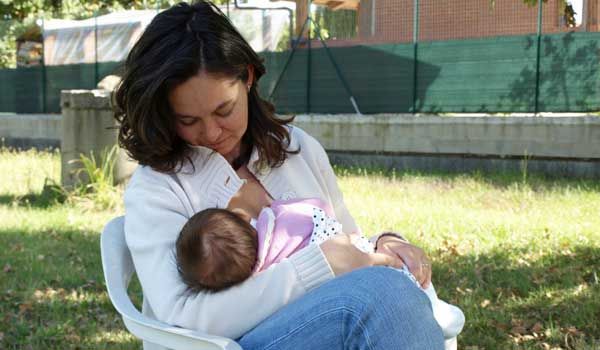
Women who were breast-fed as babies seem to have better psychological health as adults, based on a new British study.
Researchers at the University College London found that being breast-fed for at least one month had a positive effect on the psychological well-being of women in adulthood. The same effect was not observed for men.
Although the disparity between genders is not explained, the findings seem to add to the many known health benefits that emerge many years after breast-feeding, including preventing obesity, boosting heart health and lowering blood pressure and cholesterol.
"Mothers have been encouraged to breast-feed their newborn babies because of its long-term benefits to cognitive abilities and physical health," said Dr. Noriko Cable, the lead researcher on the study. "Yet findings that link breast-feeding with long-term psychological benefit have not been conclusive."
An influential 2009 study found that babies who were breast-fed for shorter periods of time had more mental health problems through childhood and into adolescence, Cable said.
The new study took that research one step further, extending into adulthood. It was published Oct. 22 in the European Journal of Public Health.
Breast-feeding and psychological well-being
Sign up for the Live Science daily newsletter now
Get the world’s most fascinating discoveries delivered straight to your inbox.
The researchers looked at data on 13,509 people from two large health studies in Great Britain that are still ongoing: the National Child Development Study, which began in 1958, and the 1970 British Cohort Study, both of which tracked about 17,000 children.
Mothers in both studies were asked to report whether they had breast-fed their children for less than one month or for at least one month.
The researchers measured the participants' psychological development as children via scales graded by the children's teachers, and they determined adult psychological well-being based on psychological tests completed when the participants were in their early 30s.
Both childhood and adult psychological health measurements were higher in women who had been breast-fed for at least a month. They showed lower levels of emotional distress, including anxiety or anguish, and higher self-efficacy, which psychologists define as people's belief in their ability to influence the events of their lives.
Men did not gain any psychological benefit in childhood or adulthood from having been breast-fed, according to the study.
The researchers did not determine whether breast-feeding's impact on women's psychological health was the result of biological factors (such as the nutritional components in milk) or social factors (such as maternal bonding).
"The research is still at an early stage to determine how breast-feeding biologically and socially influences the development of human beings from childhood onwards," Cable said.
What mothers should know
The lack of benefit for men in the study does not mean mothers should make more of an effort to breast-feed female children. In fact, the findings could mean the opposite, said Dr. Ruth Lawrence, co-author of the 2005 book "Breastfeeding: A Guide for the Medical Profession" (published by Elsevier and now in its seventh edition).
"There are some challenges to the gender differences that open up a whole new area of discussion," Lawrence said.
Lawrence said her main concern was that mothers in the study reported only whether they had breast-fed their children for more than a month or for less. Much sociological evidence has shown that women in many cultures tend to breast-feed their male children far more briefly than their female children. So the lack of benefit for males could have to do with the fact that they were not breast-fed for as long, but it's impossible to tell because the information does not extend beyond one month, Lawrence said.
Another factor to consider is that in 1958 and 1970, breast-feeding was very rare, Lawrence said. The vast majority of people in the study were not breast-fed at all.
"If we could look at individuals born in the [1980s], with a little more accurate breast-feeding information , it would be very valuable,"Lawrence said.
Pass it on: Women who were breast-fed as babies may have better psychological health as adults.
- 11 Interesting Effects of Oxytocin
- 11 Big Fat Pregnancy Myths
- Hypersex to Hoarding: 7 New Psychological Disorders
Follow MyHealthNewsDaily on Twitter @MyHealth_MHND. Find us on Facebook.













